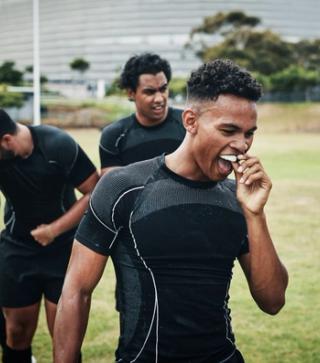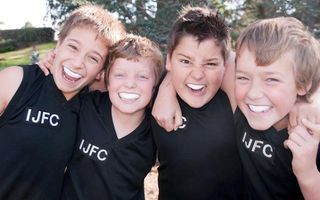
Dr Harper has a special interest in sports dentistry and how sports drinks and other aspects of sporting performance affect oral health. Whether you are part of the Melbourne football scene or just playing local basketball around Richmond we believe a custom-fitted mouthguard should be an essential part of your sporting kit.
At Richmond Fine Dentistry, we want to ensure that any sport participants are aware of and have access to the best mouthguard and trauma treatment available. Properly diagnosed, designed and custom made mouthguards are essential in the prevention of athletic oral/facial injuries.
What is a custom sports mouthguard?
At Richmond Fine Dentistry we specialise in custom sports mouthguards.
A custom-fitted mouthguard is constructed directly from a mould taken of your teeth in the dental surgery and fits tightly and comfortably over your teeth. This type of mouthguard is the type recommended by the dental profession and sporting authorities and is the most effective in preventing injuries to the teeth and jaws.
With a Richmond Fine Dentistry mouthguard you will be able to speak and breathe easily. You won’t lose it because we embed your name or phone number in it and provide a protective carry case. We also tailor a mouthguard to grow with a child so you do not constantly need to replace it when their teeth change so quickly. We can also work around braces – you still need to wear a mouthguard despite having braces.

Not just protection for teeth
A mouthguard is not just to save your teeth from sustaining an injury. A correctly fitted sports mouthguard will protect your entire mouth by cushioning a blow and distributing the force of the impact, helping to prevent jaw fractures, and reduce neck and muscle injuries that can occur when your lower jaw is unexpectedly forced into the upper jaw.
When should a mouthguard be worn?
We recommend wearing a mouthguard during any sport where there is the chance of a knock to the face.
Mouthguards should be worn during all competitions as well as during training sessions, as this is when many injuries occur. This should be stressed to children in junior teams.
Though we often think of protecting permanent teeth, a mouthguard is just as important for children to protect their developing teeth and facial bone structure. If your child’s tooth is fractured, knocked out or they receive a jaw injury, it may result dental complications that require extensive long-term restorative treatments.
Store-bought DIY mouthguards
The “do it yourself” sports mouthguards available at many pharmacies are usually poorly-fitting and uncomfortable to wear. These types of mouthguards can impede your ability to talk and breathe easily and cause gum irritation as they do not provide a snug fit. Because of this discomfort, children are less likely to comply with wearing them, and often fiddle with during play. Sporting authorities do not recommend these as they offer little protection to the teeth. Patients are encouraged to obtain the custom-fitted guard.
Our Erkodent mouthguards
We make our mouthguards in house and have invested in technology to make high performance mouthguards. We tailor our mouthguards to your particular sport – different thicknesses and styles work better for different sports. At Richmond Fine Dentistry we use and recommend the new ERKODENT lite pro laminated sports mouthguard. The lamination process enables thin, strong mouthguards which aid breathing and speaking.
Colours are also available along with plain white, which is the most popular.
Mouthguards for orthodontic patients
If the child is in the middle of orthodontic treatment, they may be encouraged to avoid contact or collision sports for the duration because of the potential of lip lacerations. However, there are ways of making mouthguards that still fit reasonably well if sport must continue. Using our Erkodent technology, we can make a mouthguard to fit with braces.
Your smile is your most important asset and should have the best protection possible. Talk to one of our team today about the new Erkodent Lite Pro Laminated Sports Mouthguard.

Caring for your mouthguard
- Clean your mouthguard in warm soapy water (not hot) after every time you wear it to prevent the build-up of bacteria.
- Store your mouthguard in a plastic container that has several holes so it can dry completely, this will prevent the bacterial growth.
- Do not leave you mouthguard in direct sunlight or in a car, as heat can warp it out of shape.
- Do not chew on the edges, twist or bend your mouthguard as this can alter its shape and prevent it from fitting snugly over your teeth and reduce its effectiveness.
Frequently asked questions
Custom mouthguards usually cost between $200 and $350, and are typically tailored for a more comfortable fit and better protection.
If you have dental extras, many health funds will cover the cost of a custom-fitted mouthguard. Check with your health fund provider to see what you are covered for.
Yes. You can get a mouthguard for grinding teeth. Those with bruxism typically grind their teeth during sleep when they are unable to stop this damaging habit consciously.
While you work on methods to stop the grinding, you can wear a custom mouthguard to protect your teeth from wearing down during sleep.
If snoring means you or your partner are kept awake during the night, you should first check with your general practitioner in case obstructive sleep apnoea (OSA) is the cause. It's important to get a diagnosis, as OSA can be dangerous and lead to accidents due to lack of sleep.
If you have obstructive sleep apnoea and it’s not severe, your dentist may suggest a custom-fitted mouthguard that will help prevent snoring. These oral appliances are used in conjunction with other methods of treatment including assisting weight loss, exercise, and adjusting your sleeping position.
A mouthguard in sports is designed to minimise and potentially completely avoid any damage to your teeth and gums. Many sports with high levels of physical contact, such as rugby and hockey, require players to wear mouthguards in order to protect teeth.
A good mouthguard will do this by adding a thick layer of protective plastic around your teeth, so even if you have a collision with another player, get tackled, or have some other physical clash, your teeth have a layer of plastic around them to absorb some of the shock, much like a helmet does for your head.
This minimises the risk of chipped and cracked teeth as well as broken and knocked out teeth.
No, it is not a good idea to sleep with your sports mouthguard in. If you need a mouthguard to help with bruxism (clenching or grinding in your sleep), you must use a mouthguard specifically made for this issue.
That’s because a bruxism night guard and a sports mouthguard are designed to be different.
A bruxism night guard does not cover your gums, so can be worn comfortably for long periods of time without risking your gum health. Night guards are also less thick and bulky for more comfortable wear, and are perforated with holes to allow water and saliva to pass through more easily and avoid bacteria building up.
Overall, only use a sports mouthguard for sports, and switch to a custom-made night guard for sleeping.
Technically speaking, a mouthguard will not stop you from clenching your teeth. However, it will protect your teeth from wearing down due to clenching or teeth grinding.
Your dentist will work with you to find solutions to help you keep from clenching, such as finding ways to reduce your stress, so that you no longer need a mouthguard to protect your teeth.

